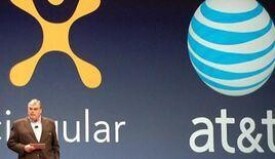Cingular
Cingular
Cingular,美國第二大無線運營商。它是SBC和BellSouth的合資公司,為超過2100萬客戶提供無線語音、文本和Internet服務。Cingular在仔細考察了若干個應用結構平台後,選擇了BEA Weblogic。

Cingular
Cingular的首席信息執行官Thaddeus Arroyo說:“在BEA WebLogic上實現標準化,意味著我們可以在基礎結構上節省資源,而投入更多的資源來使我們的業務與眾不同。實際的結果是我們減少了日常的開支,能更快地部署新的應用,更有效地獲得新客戶。BEA Weblogic為我們帶來了適應需求變化以及技術革新所需要的靈活性。”
Cingualr在BEA Weblogic Server上已投產的應用包括POSablilities 和XML 票據交換所。POSabilities是Cingular零售商的一個零售點解決方案,讓零售點職員可以註冊新的電話,並在很短的時間內激活客戶服務。XML票據交換所使Cingular的合作夥伴能夠在他們的Web站點上註冊新客戶。這個系統還可校驗基於客戶住宅電話區號的服務計劃的可用性,以及對賬戶激活、電話號碼分配和信用驗證進行管理。
下一個準備開展的主要應用是Cingular的員工門戶。此門戶被設計用來加強員工間的協作和交流。Cingular將採用BEA WebLogic Potal來實施這一戰略性的項目,這是因為它提供了一個全面的門戶框架,能夠簡化門戶開發和管理,同時降低成本,便於將業務信息擴展至客戶、合作夥伴和僱員。體現WebLogic Potal性能的全面性的一個例子是其能夠支持多設備的無線擴展通訊。
Cingular Wireless LLC是美國最大的行動電話公司,總部設在美國喬治亞州的亞太蘭大。在2001年Cingular Wireless(新格勒無線)由現在的AT&T(當時的SBC)和貝爾南方合資創辦,這一合資也創造了全美國內第二大的電信公司。構成的Cingular的一共包括了11家地區性的公司。在2004年2月宣布與AT&T無線公司的價值419億美元的巨資收購合併,此合併在當年10月16日最終完成。合併后的公司靠著4千6百萬的用戶量而使Cingular成為了全國最大的無線業務服務提供商。
Cingular運營著包括數種科技的網路。最廣泛使用的一種技術便是GSM(全球移動系統)。在GSM網上之上他們還運行著一個叫作GPRS(全局分組無線服務)的數據網路和能提供更多的速度的升級產品,叫作EDGE(改進數據率GSM服務)。Cingular同時支持原先的TDMA及模擬的網路。
Cingular Wireless LLC is the largest United States mobile phone company, with headquarters in Atlanta, Georgia, United States. Cingular operates a network of multiple technologies. The most widely used of these technologies is called Global Systems for Mobile, or GSM. On top of their GSM network they run a data network called GPRS (general packet radio service) and an upgrade for faster speeds called EDGE (enhanced data rates for global evolution). Cingular supports their legacy networks of TDMA and Analog. Former networks include various paging services and the Cingular Interactive division that became Velocita Wireless.
History
Cingular Wireless was formed in 2001 as a joint venture of SBC Communications (now AT&T) and BellSouth. The joint venture created the nations second largest carrier. Cingular grew out of a conglomeration of 11 regional companies. these companies include BellSouth Mobility, BellSouth Mobility DCS, Cellular One, Houston Cellular, BellSouth Wireless Data, Southwestern Bell, Pacific Bell, Nevada Bell, Ameritech Cellular, SNET and SBC Wireless. With the exception of Pacific Bell and BellSouth Mobility DCS, the digital network consisted of TDMA Technology. The Pacific Bell and BellSouth Mobility DCS networks used GSM technology on the PCS frequency (1900 Mhz). In 2002 Cingular began an initiative called "Project Genesis" which the code name for the GSM/GPRS overlay of the entire network. Project Genesis was completed by the end of 2004.
AT&T Wireless merger
After a bidding war with Britain's Vodefone PLC, Cingular announced in February, 2004 that they would purchase AT&T Wireless for 41 Billion dollars. The merger was completed on October 16, 2004. The combined company had a customer base of 46 million people which placed Cingular as the largest wireless provider in the United States.
Universal Telephone Service UMTS high-speed network known as "BroadbandConnect", the first to utilize High-Speed Downlink Packet Access (HSPDA), to counter Verizon Wireless and Sprint's EV-DO networks. UMTS was launched on December 6, 2005 in Seattle, Portland, San Fransico, Salt Lake City, San Jose, San Diego, Las Vegas, Phoenix, Austin, Houston, Dallas, Chicago, Boston, Baltimore and Washington D.C. Cingular is expected to launch UMTS in all major metropolitan areas by the end of 2006.
The Cingular Wireless logo prior to the acquisition of AT&T Wireless, which is still used in some contexts.
GSM Facilities
In California, Nevada, North Carolina, South Carolina, eastern Tennessee, eastern and coastal Georgia, northern New Jersey and New York City, Cingular and T-Mobile USA maintained and shared a GSM-1900 network prior to the acquisition of AT&T Wireless, through a joint venture known as GSM Facilities. The network sharing agreement allowed Cingular to offer local service in northern New Jersey and New York City and T-Mobile to offer service in California and Nevada. On May 25, 2004, Cingular and T-Mobile USA announced their intention to dissolve the agreement contingent on Cingular's successful acquisition of AT&T Wireless.
First announced on June 23, 2005 Cingular Wireless announced the intention to divest its Caribbean and Bermuda operations and licenses which it acquired from the acquisition of AT&T Wireless, to Bermuda-based Digcel Group under undisclosed financial terms.
Cingular outsources some of their Customer Care to companies in Canada and overseas.
On August 25, Cingular was removed from the New York Better Business Bureau because of a large number of complaints that were not handled in a timely manner. The company is in the process of restructuring its customer care procedures and has appealed the decision. It remains a member of the BBB in other states in which it operates.
In 2004, the Federal Communications Commission (FCC) reported logging more than 14,000 complaints (or 289 per million subscribers) against Cingular Wireless. The most common of which included number portability issues, over billing, poor customer support and network reliability.
Possible Name Change
On 20 November 2005, Ed Whitacre, CEO of the newly-merged SBC/AT&T, announced plans to market the service under the AT&T banner. BellSouth spokesman Jeff Battcher countered that the terms of the joint venture allow either party to sell the service under another name, and that he believes they will be using the brand to market to business customers. Cingular president Stan Sigman concurred with BellSouth's position, indicating that the Cingular brand would continue but be sold under the AT&T brand where offered in packages with other AT&T services, such as data and wireline telephony.
Adelante
Recently, Cingular has launched a new ad campaign "Adelante". In Spanish it means literally "forward". It is aimed at the Hispanic and Spanish speaking communities in the U.S. to boost sales and consists of newspaper ads, commercials, and magazine ads. Also, part of "Adelante" is to now start offering bilingual support at its stores for English and Spanish.
Trivia
In 2005, Communications Workers of America, the union which represents over half of Cingular's employees, specifically recognized Cingular for excellence as a union employer, in direct contrast to competitor Verizon, which CWA singled out as an aggressive union-buster.
A sales boost is expected following January 2006, when RadioShack (the top wireless retailer in the US) will no longer sell Verizon phones and instead will sell Cingular phones.
Cingular Wireless is the wireless carrier of the street racers in Electronic Arts' street racing video games Need for Speed Underground 2 and Need for Speed: Most Wanted. It is used to receive SMS messages from other racers.
